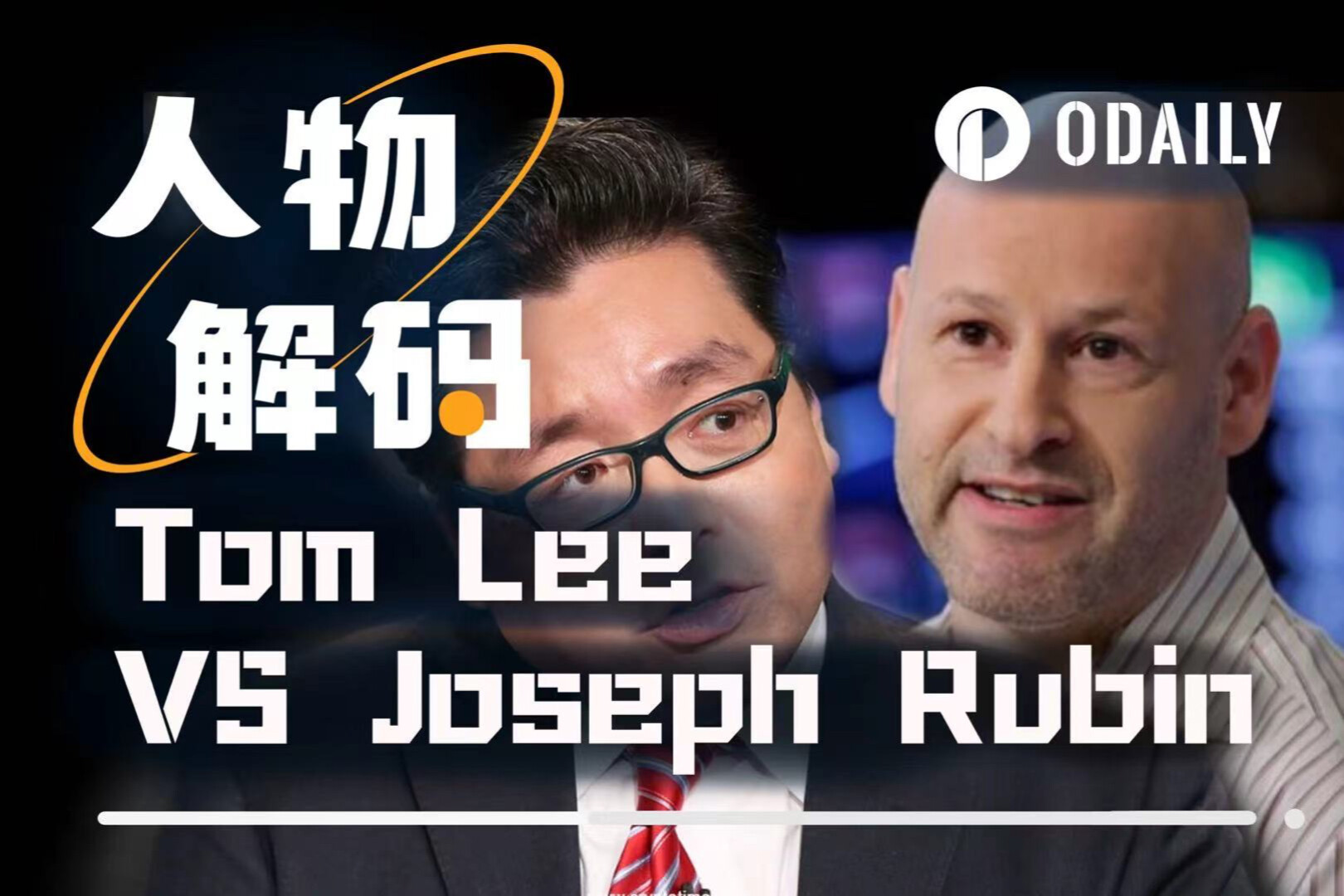Original title: The Story of Fat Penguin CEO Luca Netz
Written by Thejaswini MA
Compiled by: Block unicorn
Preface
The boxes at the Ring delivery center wouldn't pack themselves, but 16-year-old Luca Netz was constantly distracted. Around him, his colleagues expertly and efficiently completed their shifts. But Netz was obsessed with building a startup into a billion-dollar acquisition company.
He had dropped out of school for this warehouse job, had spent most of his childhood sleeping wherever his mother could find him, and now he was seeing firsthand how companies truly create wealth.
The experience taught him how startups scale, burn through capital, and fight to survive and reach escape velocity.
Years later, that lesson proved invaluable when Netz bet $2.5 million on a group of cartoon penguins that most people considered worthless. Today, those penguins are on Walmart shelves, and the once-homeless Los Angeles teenager has become one of the most influential builders in the cryptocurrency space, worth over $100 million at the age of 25.
"We were homeless for about ten years," Netz recalls calmly. "We lived all over the world, from South Africa to Paris, London, New York, and Los Angeles. We lived like this as long as my mom could muster the courage."
The growth of a liar
Netz's mother, an undocumented immigrant from France, spoke little English and struggled to find steady work. They moved constantly, staying with friends, acquaintances, and sometimes even strangers willing to take them in temporarily. For little Luca, home was wherever they happened to sleep that week.
Most people would consider such an upbringing a handicap. Netz, however, learned to view it as an education. Constant displacement taught him adaptability. Uncertainty trained him to spot opportunities others overlooked. Hunger taught him to act quickly when opportunities arose.
By middle school, Netz had discovered a simple truth: his classmates were willing to pay more for convenience rather than walk to Burger King. So he started buying chicken sandwiches and snacks and selling them at a markup from his backpack. Simple math, but effective.
When Netz was twelve, his family finally settled in central Los Angeles. There, he got his first taste of stability. The constant moving stopped, at least for a few years.
At sixteen, Netz dropped out of high school, printed out a hundred resumes, and then scoured Santa Monica's tech streets, visiting every startup he could find, like he was campaigning for something.
Ring hired him. It was 2015, and the smart doorbell company had just 20 employees and big dreams. Netz started in the warehouse—packing boxes, fulfilling orders—the kind of work most people don't think twice about. But he was watching far beyond that: funding rounds, hiring sprees, and how problems were being solved (or not solved).
He watched Ring grow from a humble startup to a billion-dollar acquisition target for Amazon. Venture capital poured in while he packed boxes. The company expanded while he processed orders. He gained an education in the mechanics of startups that no mainstream MBA program could offer.
“I was able to see a company go from raising a million dollars to becoming a billion-dollar company,” Netz recalls.
Golden Chain Epiphany
While working at Ring, the 16-year-old Netz began to notice a strange phenomenon in hip-hop culture. Rappers would spend tens, even hundreds, of thousands of dollars on gold chains and diamond jewelry. But upon closer inspection, he discovered that most fans couldn't tell the difference between a $100,000 gold chain and a $200 gold-plated replica.
This observation became the foundation of his first real business. Netz found suppliers of gold-plated chains and cubic zirconia diamonds that looked almost identical to more expensive versions. He then developed a marketing strategy that was both simple and ingenious: He would pay fan pages of popular rappers $50 to $100 to promote his jewelry.
“Every time I paid them and they published my promotion, we’d make back $1,000 to $2,000 or even $5,000 every time,” he recalls. The return on investment was so high that he could immediately reinvest the profits and expand aggressively.
Nine months after launching his dropshipping business on Shopify, Netz earned his first million. He was 18. He eventually sold the jewelry business for $8 million, which gave him the capital to pursue bigger goals.
With money in the bank, Netz began diversifying, leveraging the social media marketing experience he had gained in the jewelry business. He gained experience managing an established brand by becoming chief marketing officer of the iconic clothing brand Von Dutch.
He subsequently became Chief Marketing Officer and lead investor of Gel Blaster, a toy company that produced Orbeez-based toy guns. Under his marketing leadership, Gel Blaster achieved significant market success, being named "the fastest growing toy company in North America" by industry publications.
But the universe had something much cuter in store for him.
Penguin Rescue
At the start of 2022, the NFT market was still buoyed by the previous year’s explosion. Digital artworks were selling for millions of dollars, celebrities were replacing their avatars with cartoon apes, and new projects were launched daily, promising the next Disney.
One of these was Pudgy Penguins, a collection of 8,888 cartoon penguin NFTs that attracted attention with its adorable design and strong community. However, by January 2022, the project was in crisis. The original founders had overpromised and underdelivered, leaving roadmap items unfulfilled. There were allegations of financial mismanagement, and community trust had collapsed.
On January 6, 2022, the community voted to expel the original founders. On the same day, Netz publicly offered on Twitter to purchase the entire Pudgy Penguins series and its intellectual property rights for 750 ETH (approximately $2.5 million at the time).
It wasn’t an easy decision. The acquisition took place a week before the NFT market entered a two-year bear market. Netz and his executive team raised funds for the acquisition and worked without pay for a year while investing another $500,000 of their own capital to keep the project afloat.
It was the potential to build a lasting brand that drew him in. “If I closed my eyes and couldn’t imagine Pudgy Penguins becoming a billion-dollar brand, I would never have bought it,” he says.
Beyond Digital Collectibles
Most people assumed that Netz would flip Pudgy Penguins, clean up the mess, drive up the floor price, and then sell it to the next buyer. However, he completely ignored the NFT market.
Under Igloo Inc., Pudgy Penguins became something unprecedented: a crypto-brand operating in the real world. Netz established six revenue streams: digital experiences, physical products, licensing, content creation, film and television development, and gaming. These penguins are no longer just avatars; they're characters in a larger story.
The physical product strategy seemed crazy at first. A cryptocurrency enthusiast buying a stuffed penguin? But Netz's target wasn't cryptocurrency enthusiasts; it was parents at Walmart.
Each plush toy comes with a QR code that directs buyers to "Pudgy World," a digital space where users can obtain crypto wallets and claim NFT wearables.
Pudgy World is a free 3D browser game where players can customize their penguin avatars and explore virtual worlds using their NFTs and physical toys, seamlessly integrating Web 3 ownership with easy-to-play gameplay. Parents think they’re buying their child a stuffed animal, but they’re actually entering Web 3 without realizing it.
The success of this strategy exceeded everyone's expectations. Pudgy Penguins toys are now on the shelves of Walmart, Target, Chuck E. Cheese's, Amazon, and Walgreens. Over 1.5 million toys have been sold, generating over $10 million in revenue in one year.
While other NFT projects collapsed or struggled to transform, Pudgy Penguins quietly became a crypto brand that could survive without relying on cryptocurrency.
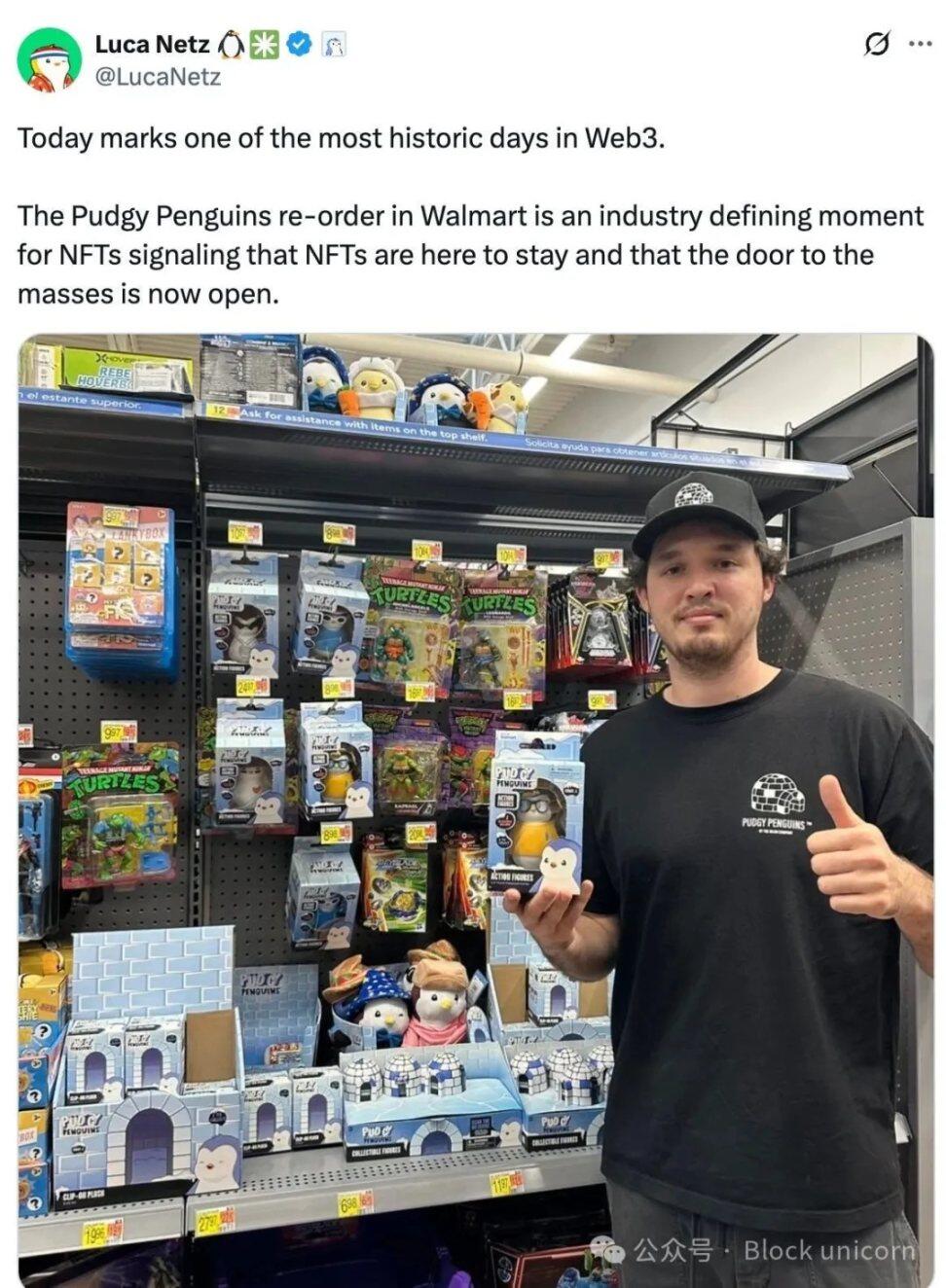
Token issuance
On December 13, 2024, Netz airdropped $1.5 billion worth of PENGU tokens to millions of user wallets across the crypto ecosystem. This was the largest airdrop in Solana's history. He chose Solana for its lower transaction fees and higher throughput to maximize accessibility.
25.9% of the tokens are allocated to the Pudgy Penguin community, 24.12% to other communities and new joiners, and the rest is distributed between team members (with a lock-up period), liquidity provision, and company reserves.
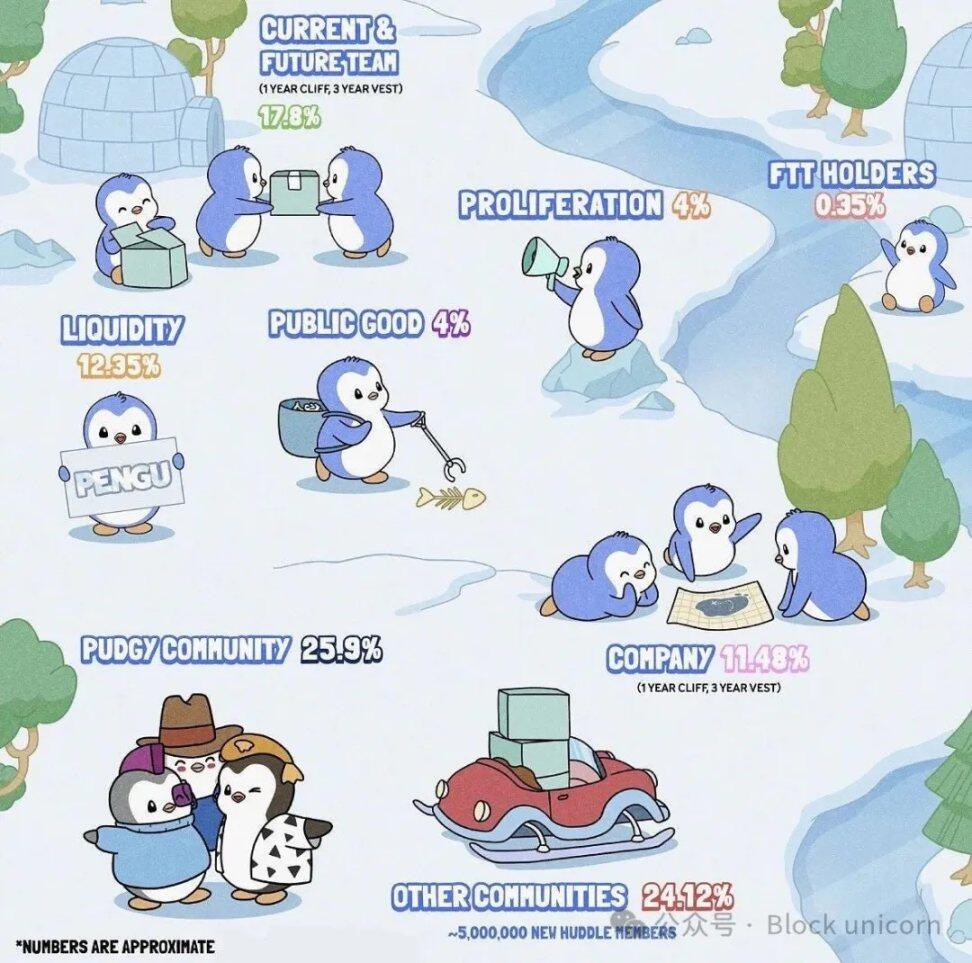
The launch sparked heated debate in the crypto community. Some praised the broad distribution for democratizing the project's success. Others criticized the distribution of tokens to millions of wallets, rather than focusing rewards on long-term holders.
Netz defended this strategy: "I'm not trying to launch a $2 billion token and stop there. I'm going after the real giants. I'm going after Dogecoin." He believes that for Pengu to reach the scale of a mature meme coin like Dogecoin, it needs a launch story that resonates with a mainstream audience.
Since its launch, PENGU's performance has borne out some of Netz's bold predictions. Debuting with a market capitalization of approximately $2.3 billion, PENGU subsequently experienced the typical volatility of large token offerings, initially experiencing a sharp decline before ultimately finding support. The token then consolidated between key price levels for several months, setting the stage for a subsequent significant rally.
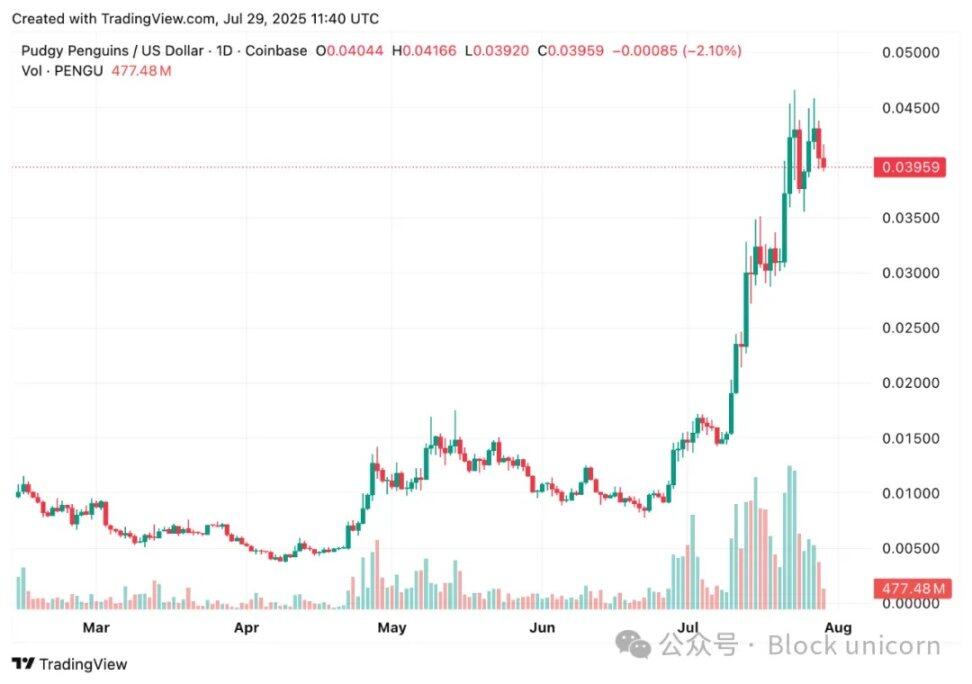
By mid-2025, with increasing accumulation by large investors and daily trading volume exceeding $2.5 billion, PENGU soared over 300% in just a few weeks, with its market capitalization exceeding $2.5 billion.
This rally was driven by multiple catalysts, demonstrating the ecosystem's growing mainstream appeal. The most significant driver was Canary Capital's SEC filing for a groundbreaking PENGU/NFT-themed ETF. This institutional validation sparked significant fear of market optimism, signaling that traditional finance was beginning to take notice of the Pudgy Penguins ecosystem. The technical foundation for the rally was provided by the accumulation of large investors, who have acquired over 200 million PENGU tokens since July alone. The surge in trading volume reflects the strong interest from both institutional and retail investors.
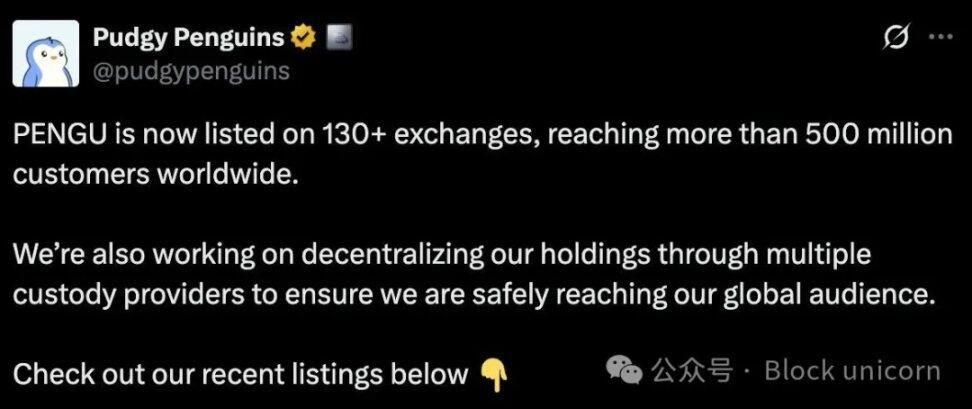
Strategic partnerships with major brands, including NASCAR, Lufthansa, and Suplay Inc., brought unprecedented exposure beyond the cryptosphere. Persistent rumors of a potential acquisition of OpenSea by Pudgy Penguins further fueled speculation, though the team later denied these rumors.
Meanwhile, the original NFT series maintained strong performance, with the floor price stabilizing at 15-16 ETH, a significant recovery from the bear market lows, validating Netz's strategy of creating lasting value that transcends short-term speculation.
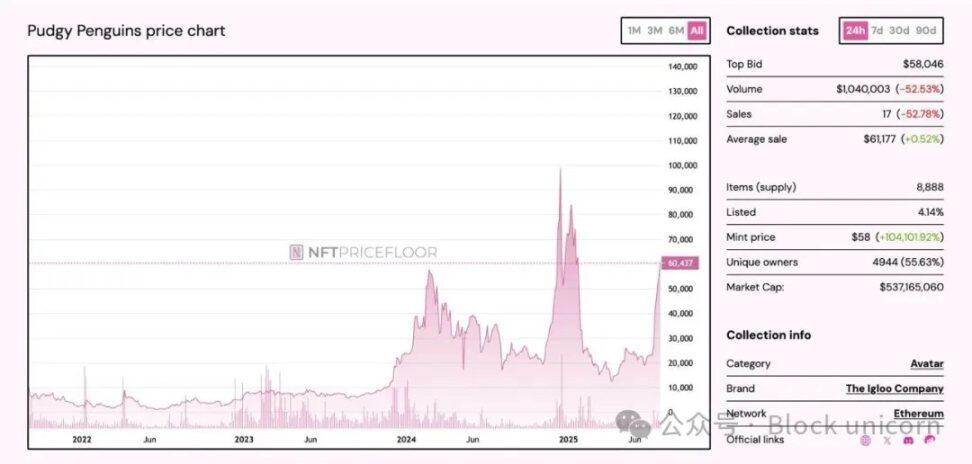
Building a consumer blockchain
In January 2025, Abstract launched as Netz's boldest bet yet: a blockchain that didn't look like a blockchain. No wallets to set up. No seed phrases to store. No gas fees to calculate. Users could start transacting without even realizing they were using blockchain technology.
Netz believes the blockchain itself is the least interesting part of Abstract. In his view, consumers won't use it unless they have a reason to, and unless friction is removed. Most importantly, he wants Abstract to be fun, allowing people to play games, collect digital items, and interact with apps without having to think about the underlying technology.
This vision attracted $11 million in funding from Founders Fund and other top investors. Abstract launched with over 100 apps already in development, and over 400 more in development. These weren’t DeFi protocols or trading platforms, but rather games, music, sports, and fashion apps running on the blockchain.
This ambition reflects the man behind it. Netz works six days a week, 12 hours a day, from 8 a.m. to 8 p.m., with no vacations. His only break is from 6 p.m. to 8 p.m., which he calls "critical thinking time," where he processes the day's events and plans for the next.
Abstract could be the platform that finally brings cryptocurrency to mainstream consumers. Or it could be another expensive lesson in the gap between vision and reality. For Netz, the discomfort of not knowing the outcome is precisely the point.
Future Vision
Netz has his own theory about the future. Traditional brands sell products to consumers, and the transaction ends at the checkout counter. NFTs completely flip that model on its head. Instead of customers, you get participants; instead of buyers, you get stakeholders who share in the brand's success.
This mechanism creates unprecedented synergy. When Pudgy Penguin holders promote the brand, they implicitly become investors protecting their assets. When these toys hit Walmart shelves, every NFT holder wins. This is capitalism that allows everyone to participate.
But Netz isn't thinking about quarterly returns. He's planning for decades. The full Pudgy World experience, after 18 months of development and hundreds of thousands of accounts already created, is about to launch. He plans to aggressively expand into the Asia-Pacific market, betting that the next wave of crypto enthusiasm will emerge from the East.
Twenty-five-year-old Luca Netz stands at the intersection of two worlds that shouldn't collide: the turbulent, speculative world of cryptocurrency, where fortunes can evaporate in minutes; the slow-moving machine of traditional retail, where securing shelf space at Walmart requires months of negotiations and a proven track record.
Most people would choose a side, but Netz built a bridge.
He knows that the future isn’t about choosing between digital and physical, community and commerce, innovation and accessibility, but about proving they were never in opposition.
Every Pudgy Penguin toy sold at Target comes with a QR code that unlocks a digital world. Every PENGU token traded represents ownership of a brand that exists both in the blockchain code and in the retail item. Every Abstract user who registers with nothing more than an email address has unwittingly entered the future of finance.
That was Netz's revolution. Making the impossible inevitable. He didn't disrupt industries; he taught them to talk to each other.
In the short history of cryptocurrency, most success stories follow a familiar arc: technological breakthrough, venture capital, explosive growth, and ultimately decline. Netz wrote a different script. He turned the industry's greatest weakness—its lack of transparency to the average person—into his competitive advantage.
Some entrepreneurs build companies. Others build movements. Netz created a new category of being. One where digital ownership feels as natural as holding a stuffed animal, where global communities form around shared joy rather than common interests, and where the most complex technology hides behind the simplest experiences.
- 核心观点:Luca Netz 将 Pudgy Penguins 打造成十亿美元品牌。
- 关键要素:
- 250 万美元收购濒危 NFT 项目。
- 实体玩具年收入超 1000 万美元。
- Solana 空投代币市值 25 亿美元。
- 市场影响:开创 NFT 与传统零售融合新模式。
- 时效性标注:长期影响。



